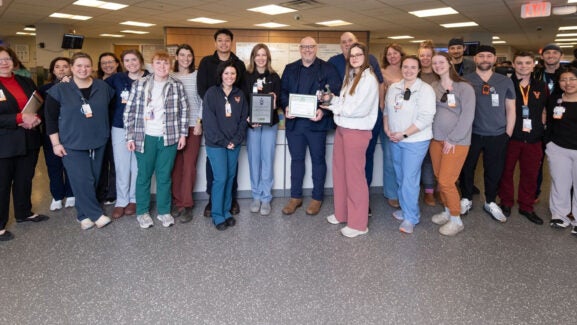
To Do This Week: Give a (Virtual) High-Five to Our Lab Colleagues
National Medical Laboratory Professionals Week, April 19-25, is an annual celebration of the medical laboratory professionals and pathologists who play a vital role in every aspect of healthcare.
At UVA Health, the Clinical Laboratory provides critical test results that help clinicians gather information needed to appropriately treat patients.
Some tests guide treatment and others can prevent disease. The patient’s clinician comes up with a differential diagnosis (a list of diseases that might fit with the patient’s symptoms) then orders a series of tests that narrows the possibilities of diseases. Samples are collected and sent to the Clinical Laboratory where they are tested, the results of which (hopefully) support one of the diagnoses on the clinician’s list and provide guidance on treatment.
Their work is behind-the-scenes, but it is a vital part of patient care — especially during the current COVID-19 (aka, SARS-CoV-2) pandemic.
To celebrate our lab colleagues, we (virtually) sat down with Dawn Dirks, MS, Molecular Test Development Specialist, and Melinda Poulter, PhD, Director, Clinical Microbiology and Associate Professor of Pathology, to discuss the meaningful work our medical labs are doing.
What is your role and what you do? What does a “normal” day look like?
Dirks: My official title is “Test Development Specialist for the Molecular Diagnostics laboratory.” I organize validations to bring new instruments and tests into the lab. This can include finding appropriate retrospective samples to use, determining which QC materials will work best, evaluating limit of detection for a given test, tracking results, writing procedures, training staff to perform the new test, and of course, keeping track of all of the paperwork required from our regulatory body.
The most recent validations done in the Molecular/Microbiology lab are the new SARS-CoV-2 tests. For me, there really isn’t a “normal” day, especially lately! I come in each morning knowing which validations are currently underway and which tasks I plan to work on, but things can change very quickly, and often do.
Poulter: Sometimes routine tests don’t provide the answer we need. That’s where the directors of individual areas in the laboratory come in. We help clinicians understand atypical results and discuss options for more esoteric testing that may reveal additional information.
UVA does quite a bit of this esoteric testing. Laboratory directors are responsible for determining the feasibility of bringing in particular tests. The decision about which COVID tests to perform fell largely on me, and I sincerely hope those choices have served our patients well. The choices for COVID antibody testing are on the shoulders of our very capable chemistry directors. We, as directors, are responsible for determining that the tests — either developed ourselves or brought in from a commercial company — work. Laboratory directors design the validation studies that prove the efficacy of any new test.
Dawn and the lead technologists (Frankie Brewster, Jim Bowden, Tiffany Kidd) manage the validations — finding samples and performing testing of clinical samples and studies to determine the limit of detection for the assays. The directors review the data generated, determine if alterations need to be made to the test or validation plan, and ultimately decide if the testing performs as expected. Dawn and the lead technologists then step back in and train staff on the testing protocols. From there, the technologists take over and do their magic.
They are the life-blood of all we do. Their expertise is critical to every test we report.
How has your work changed since the pandemic started?
Dirks: My days have become much less predictable lately because validating the new SARS-CoV-2 tests has been a moving target. UVA, like many institutions nationally, has faced shortages with reagents, equipment, and supplies. It has required us to be creative and flexible in finding solutions.
Poulter: Dawn, Frankie, and I have validated three tests for COVID-19 so far, and there is likely to be a fourth. We usually choose one assay for any organism we are targeting with a molecular test. With the supply-chain shortages and need for rapid testing, we’ve had to diversify our testing platforms to be sure we can continue to meet the growing need for COVID testing.
Early in the pandemic, I spent a tremendous amount of time communicating with various commercial companies trying to get testing supplies. It was an uphill battle with shortages for every product we needed for testing. These are duties I would not usually do, but decisions had to be made quickly, so it didn’t make sense to drop this in someone else’s lap. Many days I spent the entire day on the phone. It was crazy, but we got it done, and that’s all that matters.
During all this madness, Dr. Amy Mathers [Associate Professor of Medicine and Pathology, Associate Director of Clinical Microbiology, Medical Director Antimicrobial Stewardship] was out pounding the pavement to borrow equipment that we couldn’t purchase due to backorders.
Once testing at UVA was a reality, it became clear we needed to help other hospitals in Virginia that didn’t have access to testing with quick results. We knew that results available in 24 hours could help them manage their patients and conserve PPE, so we began offering to perform testing for other hospitals in the state.
The lines between our duties have blurred substantially since the pandemic began. No one is above doing any particular task. For example, calling with results usually falls to our customer-service [CS] area. Dr. Mathers and I were concerned that calling so many results could quickly overwhelm the CS team, so we have been doing this ourselves since going live with our first test. As we began testing for other hospitals in Virginia, it was even more important that we connect with the infectious disease physicians and epidemiologists at these institutions to answer their questions and be sure they understood the potential limitations around specimen collection and the importance of selecting the appropriate patients for testing.
I have enjoyed getting to know physicians and staff at other hospitals in our state, so am grateful we took this step. It feels good to know that we are making a difference, not just at home, but throughout the Commonwealth.
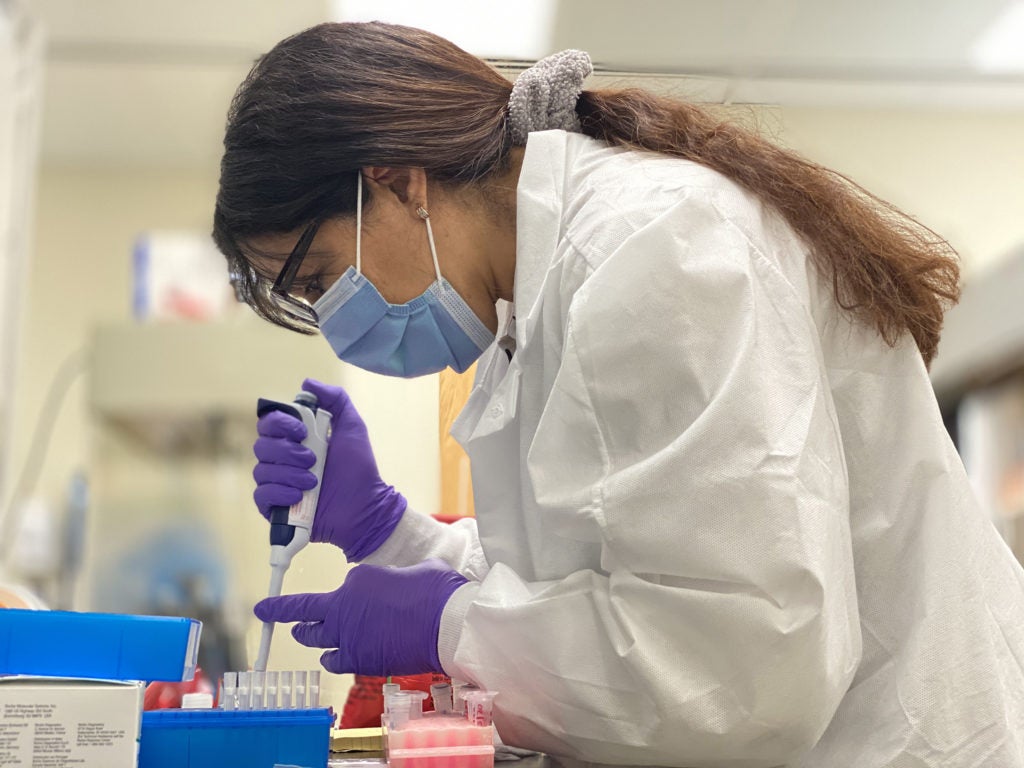
How are you celebrating National Medical Laboratory Professionals Week?
Dirks: For me, lab week is about expressing pride in the important services that we provide. I am proud to be part of a great team here in the Clinical Labs at UVA. This year’s celebration will be different because of COVID-19, but it will still be good to have time set aside to specifically honor the amazing people I work with every day.
Poulter: We usually have a number of fun activities planned for staff, but I think that has taken a back seat to the pandemic. With social distancing, it’s just not feasible to do all the fun things we have done in the past, but we will make up for it once this is under control. I just hope every single person in the Clinical Laboratories knows how proud I am to be a part of the Clinical Labs and how much I appreciate all they do, not just during a pandemic, but every day for the last 17 years.
What is your favorite part about your role? What gets you out of bed in the morning?
Dirks: For me, knowing that what we do helps patients get the best care possible is why I do what I do every day. My specific role is a lot of fun because it is always a challenge, a bit like a puzzle, in terms of figuring out the best way to demonstrate performance characteristics of a new test.
Poulter: I’m one of the lucky people in this world who wants to come to work. The work done in Clinical Micro and Molecular Diagnostics touches so many areas of UVA Health, and I’ve met remarkable people in almost every medical specialty who are brilliant and hard-working. They inspire me to work harder and do more. It’s challenging sometimes but worth the effort.
Anything else you’d like to share with colleagues across UVA Health?
Dirks: I want to express a huge thank you to everyone, not only in this time of COVID-19, but every day. Together, we do good work that makes a difference in our community.
I really want to thank Procurement. During our whirlwind validations, we needed to order many new and unexpected reagents and supplies, often for rush-processing and overnight delivery. They provided exceptional support as we navigated this process, and I am grateful.
Also, a big thank-you to Christina Pierre. She is one of the Clinical Chemistry Pathology Fellows and she was a huge help with the initial validation of the SARS-CoV-2 testing.
Poulter: All of what we do is made better by the involvement of clinicians in the Division of Infectious Diseases, our Hospital Epidemiologists, Antimicrobial Stewardship team, and Infection Control Practitioners. They use what we provide to improve the lives of our patients. I am so blessed to work with them and feel like a valued member of their teams.
I echo Dawn’s gratitude toward Procurement and Christina. There are so many others who have helped pull us through the testing frustrations of this pandemic, I can’t possibly list them all. This just begins to touch on the contributions that led to successful COVID-19 testing at UVA.
- To our donor who generously provided funding to allow the UVA Clinical Microbiology and Molecular labs to significantly increase our testing capabilities: your gift was the catalyst that allowed us to better meet the needs of our community and the Commonwealth of Virginia. Thank you.
- To UVA leadership: Thank you for helping us drive this forward. I am in awe of how completely supportive you have been from the beginning.
- To Melissa Kendall, James Casanova, and Chris Moskaluk, the faculty who loaned us equipment: I am so grateful. We wouldn’t have been able to start when we did without your contributions.
- To the faculty who sent us extraction reagents: The response to our need was so overwhelming, we couldn’t use it all. I was left speechless by your generosity.
- To our medical director Chris Moskaluk and laboratory administration, especially Jen DeArment and Lynne Foster: I can’t thank you enough for your unwavering support and unbelievable flexibility when we had to shift priorities at a moment’s notice, multiple times. Nothing accomplished here would have happened without your help.
- To Amy Mathers, the fiercest and most dedicated woman I know: You deserve a parade for your accomplishments and the leadership you provided.
- To Dawn and the lead technologists, whose tireless work was critical to making testing here a reality: I have no words. I’m glad you know how much you are valued so I don’t have to get sentimental.
- To technologists Allison O’Mara and Morgan Waddell, who stepped away from their duties in other areas of the laboratory to provide testing support, and to their directors and managers who let them come back to Molecular Micro: Thank you for your continued help. We wouldn’t be able to meet the needs of our community and the Commonwealth without you.
- Last and most importantly, to all the technologists and laboratorians in Clinical Micro, Molecular Diagnostics, Customer Service, and Specimen Management: You make everything look easy. Your kindness, poise, and positive attitudes throughout a series of completely unreasonable demands has been nothing short of inspirational. If anyone ever wants to see a list of my heroes, all you have to do is look at the roster of employees in these areas. All the accolades for COVID-19 testing belong to them and to the UVA community. Thank you for giving me the opportunity to tell you how amazing they all are.
Please join us in sending virtual high-fives to our hard-working and dedicated colleagues in the medical labs in celebration of National Medical Laboratory Professionals Week.
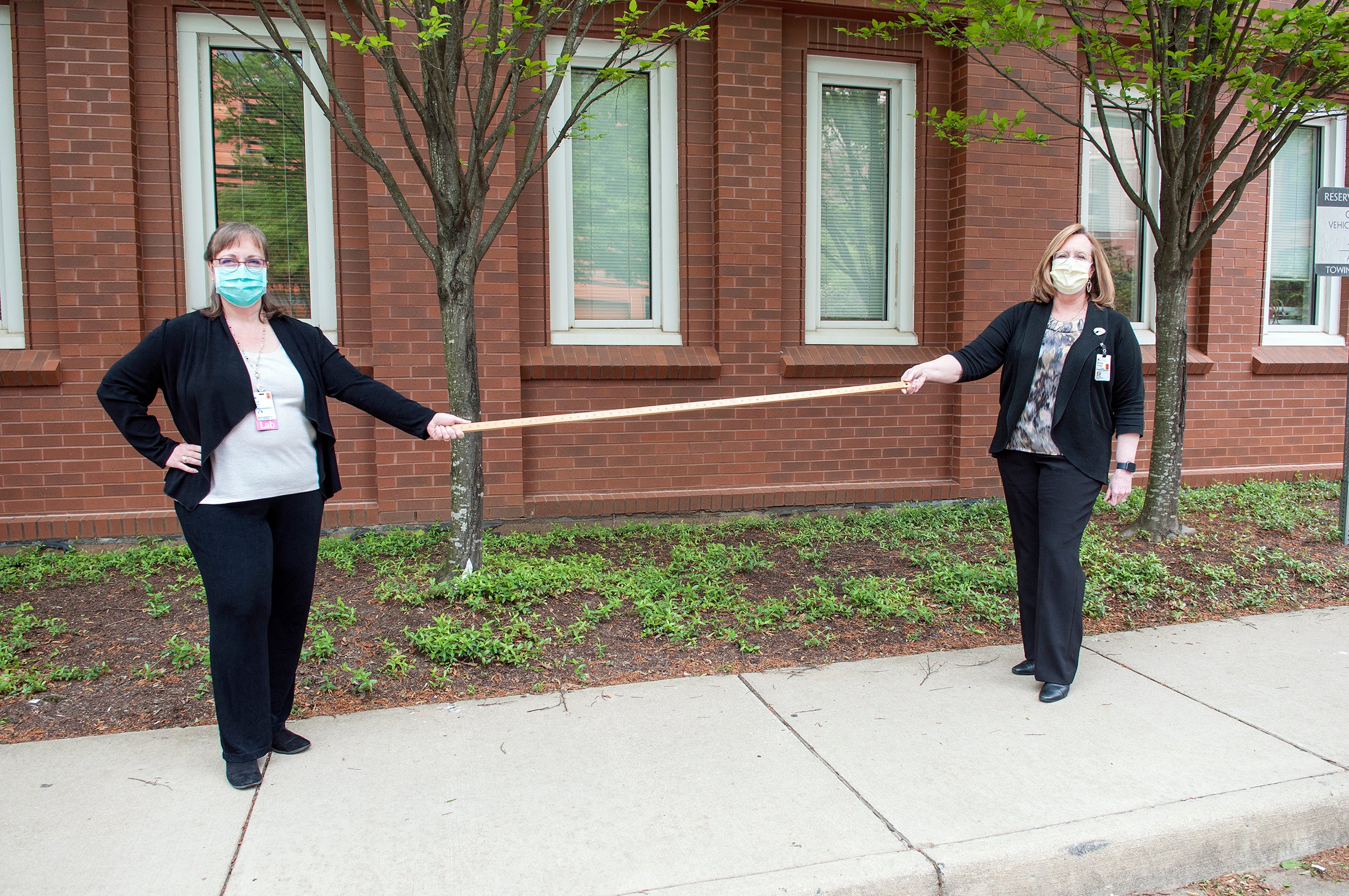
Latest News

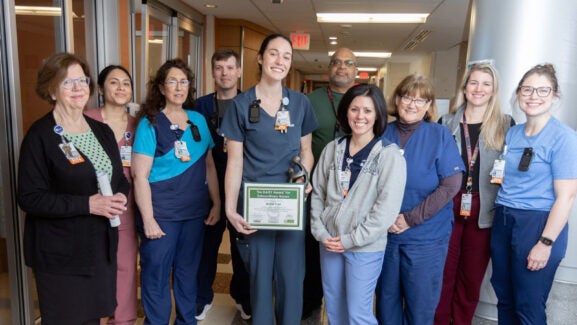
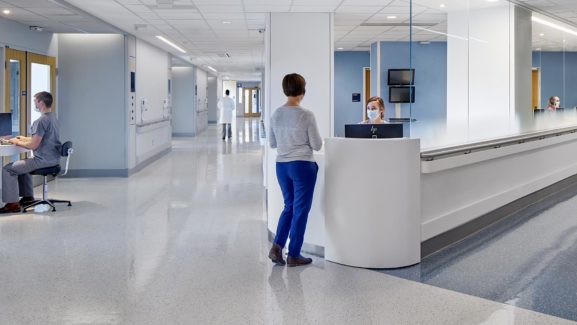
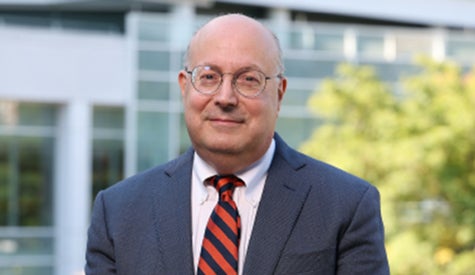
Wow, Medical Labs need more than a high five – they need medals, ticker tape parades, a banquet! Every one of them.
We are so grateful for our Medical Lab Partners! Thank You All!!
I wish happy National Medical Laboratory Professionals Week, April 19-25 to all my co-workers
we have always been the behind the scenes heroes …me personally for the last 40 years, I would not trade it for any other career, without our test results doctors could NOT diagnosis patients
Thank you for your vital work in this time of COVID-19 and always! UVA Health could not provide medical care without you of course!!
Thank you for your dedication and determination to solve this puzzle! We appreciate all of you.